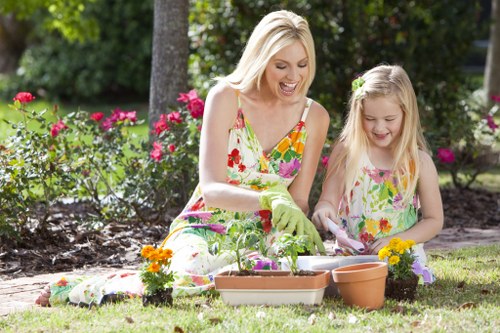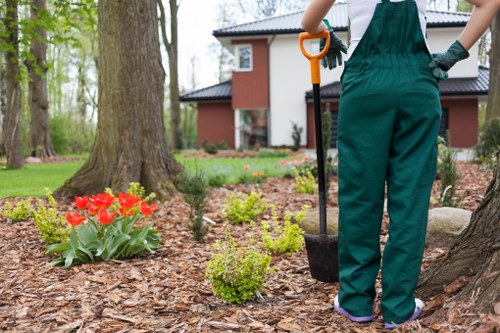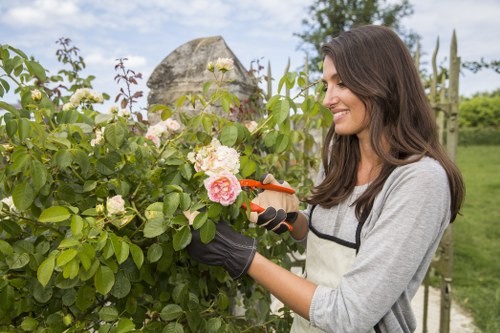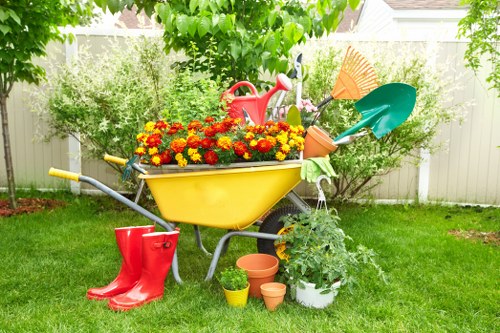Comprehensive Garden Maintenance in Southgate
Introduction to Garden Maintenance

Maintaining a beautiful garden in Southgate requires dedication, knowledge, and the right tools. Whether you're a seasoned gardener or a beginner, understanding the essentials of garden upkeep can transform your outdoor space into a lush, vibrant sanctuary.
Garden maintenance involves a variety of tasks, including pruning, weeding, watering, and pest control. Each of these tasks plays a crucial role in ensuring the health and longevity of your plants.
In Southgate, the climate and soil conditions necessitate specific maintenance strategies to keep gardens thriving year-round. This article delves into the best practices and tips for effective garden maintenance in this region.
Seasonal Garden Care

Spring Maintenance
Spring is the perfect time to rejuvenate your garden. Start by clearing out any debris from the winter months and preparing the soil for new growth.
- Soil Preparation: Test and amend the soil to ensure it has the right pH and nutrient levels.
- Pruning: Trim back any dead or overgrown branches to encourage healthy growth.
- Planting: Introduce spring-blooming flowers and vegetables to your garden.
Summer Care
Maintaining your garden during the hot summer months requires consistent effort to keep plants hydrated and healthy.
- Watering: Ensure plants receive adequate water, especially during drought conditions.
- Pest Control: Monitor for pests and diseases, and take action promptly to prevent infestations.
- Mulching: Apply mulch to retain moisture and suppress weed growth.
Essential Garden Tools

Basic Tools Every Gardener Needs
Having the right tools is fundamental to effective garden maintenance. Here are some essential tools that every gardener in Southgate should have:
- Pruners: For trimming trees and shrubs.
- Spade: Ideal for digging and turning soil.
- Garden Hose: For efficient watering of plants.
- Weeder: To remove unwanted plants and weeds.
- Gloves: Protect your hands while working in the garden.
Advanced Tools for Enhanced Maintenance
For those looking to take their garden maintenance to the next level, consider investing in advanced tools such as:
- Lawn Mower: Keep your grass in pristine condition.
- Garden Fork: Assist with aerating the soil and removing debris.
- Sprayers: Apply pesticides and fertilizers accurately.
Tool Maintenance Tips
Regular maintenance of your garden tools ensures longevity and optimal performance:
- Cleaning: Remove dirt and debris after each use.
- Sharpening: Keep blades sharp for efficient cutting.
- Storage: Store tools in a dry place to prevent rust and damage.
Plant Care and Selection

Choosing the Right Plants for Southgate
Selecting plants that thrive in Southgate's climate is key to a successful garden. Consider the following factors when choosing plants:
- Climate: Opt for plants that are well-suited to the local weather conditions.
- Soil Type: Test your soil and choose plants that complement its composition.
- Sunlight: Ensure your plants receive the appropriate amount of sunlight.
Plant Maintenance Tips
Proper plant care enhances the beauty and health of your garden:
- Watering: Provide consistent moisture without overwatering.
- Fertilizing: Supply necessary nutrients to promote growth.
- Pruning: Regularly trim plants to remove dead parts and encourage new growth.
Specialized Care for Different Plant Types
Certain plants require specialized care to thrive:
- Perennials: These plants regrow each spring and may need division every few years.
- Annuals: These complete their life cycle in one season and need replanting each year.
- Shrubs: Require regular pruning to maintain shape and health.
Lawn Care and Maintenance

Maintaining a Healthy Lawn
A lush green lawn is the centerpiece of any garden. Proper lawn care involves several key practices:
- Mowing: Regular mowing at the correct height promotes healthy grass growth.
- Aeration: Aerate your lawn to improve soil health and root development.
- Fertilization: Apply fertilizers to supply essential nutrients.
Dealing with Common Lawn Problems
Addressing lawn issues promptly ensures it remains vibrant and healthy:
- Weed Control: Remove weeds regularly to prevent them from overtaking your lawn.
- Pest Management: Identify and treat pest infestations early.
- Disease Prevention: Implement practices to prevent common lawn diseases.
Seasonal Lawn Care Tips
Adapt your lawn care routine to the changing seasons:
- Spring: Focus on fertilizing and aerating.
- Summer: Maintain consistent watering and mowing.
- Autumn: Prepare your lawn for winter by cleaning up debris and applying a final fertilizer.
Garden Design and Landscaping
Creating a Harmonious Garden Layout
Effective garden design enhances both aesthetics and functionality. Consider the following elements when planning your garden layout:
- Pathways: Create clear paths to navigate through your garden.
- Plant Arrangement: Group plants with similar care requirements together.
- Focal Points: Incorporate features like statues, fountains, or seating areas.
Incorporating Sustainable Practices
Adopting sustainable gardening practices benefits both your garden and the environment:
- Rainwater Harvesting: Collect rainwater for irrigation.
- Composting: Recycle garden waste to enrich the soil.
- Native Plants: Use native species that require less water and are more resilient.
Enhancing Garden Aesthetics
Boost your garden's visual appeal with the following tips:
- Color Coordination: Choose plant colors that complement each other.
- Texture Variety: Incorporate plants with different leaf textures.
- Lighting: Use outdoor lighting to highlight garden features and extend usability into the evening.
Professional Landscaping Services
For those seeking expert assistance, professional landscaping services in Southgate can help design and maintain your garden:
- Design Consultation: Work with landscapers to create a customized garden plan.
- Installation: Professionals handle the planting and setup of garden features.
- Ongoing Maintenance: Regular upkeep by experts ensures your garden remains pristine.
Pest and Disease Management
Identifying Common Garden Pests
Understanding the pests that affect your garden is crucial for effective management. Common pests in Southgate gardens include:
- Aphids: Small insects that suck sap from plants.
- Slugs and Snails: Mollusks that feed on a variety of plants.
- Spider Mites: Tiny arachnids that cause leaf discoloration.
Organic Pest Control Methods
Opting for organic pest control minimizes harm to beneficial insects and the environment:
- Neem Oil: A natural pesticide effective against a range of pests.
- Insecticidal Soaps: Safe for plants and effective against soft-bodied insects.
- Beneficial Insects: Introduce ladybugs and predatory beetles to control pest populations.
Disease Prevention and Treatment
Preventing plant diseases involves maintaining healthy growing conditions and prompt treatment if issues arise:
- Proper Spacing: Ensure adequate air circulation between plants.
- Sanitation: Remove and dispose of infected plant material.
- Resistant Varieties: Plant disease-resistant species to reduce susceptibility.
Integrated Pest Management (IPM)
IPM combines multiple strategies for sustainable pest and disease control:
- Monitoring: Regularly inspect plants for signs of pests and diseases.
- Biological Control: Use natural predators to manage pest populations.
- Cultural Practices: Implement gardening techniques that reduce pest habitats.
Watering and Irrigation
Efficient Watering Techniques
Proper watering is essential for plant health. Implementing efficient watering techniques conserves water and promotes healthy growth:
- Drip Irrigation: Delivers water directly to plant roots, reducing evaporation.
- Soaker Hoses: Slowly release water along their length, ideal for garden beds.
- Rain Barrels: Collect and store rainwater for later use.
Scheduling Your Irrigation
Timing your irrigation correctly maximizes water usage and plant uptake:
- Early Morning: Watering in the morning reduces evaporation and fungal growth.
- Evening: If morning watering isn't possible, water in the late afternoon.
- Avoid Midday: High temperatures can lead to water waste through evaporation.
Soil Moisture Management
Maintaining appropriate soil moisture levels is key to preventing plant stress:
- Mulching: Helps retain soil moisture and regulate temperature.
- Soil Testing: Regularly check moisture levels to adjust watering schedules.
- Deep Watering: Ensure water reaches the root zone by watering deeply and less frequently.
Water Conservation Tips
Conserving water in your garden not only benefits the environment but also reduces utility costs:
- Use Native Plants: They require less water and are more resilient.
- Implement Drip Irrigation: More efficient than traditional sprinklers.
- Rainwater Harvesting: Utilize collected rainwater for irrigation needs.
Soil Health and Fertility
Understanding Soil Composition
A healthy garden starts with rich, fertile soil. Understanding the composition of your soil helps in making informed maintenance decisions:
- Sandy Soil: Drains quickly but may lack nutrients.
- Clay Soil: Retains moisture but can become compacted.
- Loamy Soil: Balanced mixture of sand, silt, and clay, ideal for most plants.
Improving Soil Fertility
Enhancing soil fertility ensures your plants receive the necessary nutrients for growth:
- Organic Compost: Enriches the soil with essential nutrients and improves structure.
- Green Manure: Incorporate cover crops to add organic matter.
- Fertilizers: Use balanced fertilizers tailored to your soil's needs.
Soil pH Management
Maintaining the correct soil pH is vital for nutrient availability:
- Testing Soil pH: Use a soil test kit to determine acidity or alkalinity levels.
- Adjusting pH: Amend soil with lime to raise pH or sulfur to lower pH as needed.
- Choosing Plants: Select plants that thrive in your soil's pH range.
Mulching for Soil Health
Mulching offers multiple benefits for soil health:
- Moisture Retention: Reduces the need for frequent watering.
- Weed Suppression: Limits the growth of unwanted plants.
- Temperature Regulation: Keeps soil temperatures stable, protecting plant roots.
Composting Techniques
Effective composting transforms garden waste into valuable soil amendments:
- Balanced Ingredients: Combine green (nitrogen-rich) and brown (carbon-rich) materials.
- Regular Turning: Aerate the compost to speed up decomposition.
- Moisture Control: Maintain moisture levels similar to a damp sponge.
Pruning and Trimming
The Importance of Regular Pruning
Pruning is essential for maintaining plant health, aesthetics, and growth. Proper pruning techniques can lead to more robust and vibrant plants:
- Removing Deadwood: Eliminates diseased or damaged branches.
- Shaping Plants: Helps maintain desired plant forms and sizes.
- Enhancing Airflow: Improves circulation, reducing the risk of fungal infections.
Pruning Techniques for Different Plants
Different plants require specific pruning methods to thrive:
- Shrubs: Prune in early spring before new growth begins.
- Trees: Remove crossing branches and shape mature trees in late winter.
- Flowering Plants: Trim spent blooms to encourage continuous flowering.
Tools for Effective Pruning
Using the right tools ensures clean cuts and minimizes plant stress:
- Hand Pruners: Ideal for small branches and precision cuts.
- Loppers: Suitable for medium-sized branches.
- Pruning Saws: Necessary for larger branches that require more force.
Pruning Best Practices
Follow these best practices to achieve the best results:
- Sanitize Tools: Prevent the spread of diseases by disinfecting tools before use.
- Cut at the Right Angle: Make clean cuts at a 45-degree angle to promote healing.
- Don't Over-Prune: Remove no more than 20% of the plant at a time to avoid stress.
When to Prune
Timing is crucial for effective pruning:
- Spring-Flowering Plants: Prune immediately after flowering.
- Summer-Flowering Plants: Prune in late winter or early spring.
- Trees: Prune during the dormant season for minimal disruption.
Weed Control Strategies
Identifying Common Weeds in Southgate
Weeds can compete with your plants for nutrients, water, and light. Common weeds in Southgate include:
- Dandelions: Easily recognizable by their bright yellow flowers and fluffy seed heads.
- Crabgrass: A fast-growing annual that spreads rapidly.
- Thistle: Prickly plants that can be invasive in gardens.
Preventative Weed Control
Preventing weed growth is more effective than trying to remove them after they've established:
- Mulching: Use organic or inorganic mulch to block weed growth.
- Landscape Fabric: Install fabric under mulch to provide an additional barrier.
- Dense Planting: Plant densely to shade the soil and reduce space for weeds.
Manual Weed Removal
Physically removing weeds can be labor-intensive but effective:
- Hand Weeding: Remove weeds by hand, ensuring the entire root system is extracted.
- Hoeing: Use a hoe to cut weeds off at the soil surface.
- Pulling: Focus on pulling weeds when the soil is moist for easier extraction.
Chemical Weed Control
When manual methods are insufficient, chemical treatments may be necessary:
- Herbicides: Selective herbicides target specific weed types without harming desired plants.
- Pre-Emergent Herbicides: Prevent weed seeds from germinating.
- Post-Emergent Herbicides: Kill actively growing weeds.
Organic Weed Solutions
For environmentally friendly weed control, consider organic solutions:
- Vinegar: Use vinegar-based sprays to kill weeds.
- Boiling Water: Pour boiling water directly onto weeds to destroy them.
- Cornmeal Gluten: Acts as a natural pre-emergent to prevent weed seed germination.
Hardscaping and Outdoor Structures
Incorporating Hardscaping Elements
Hardscaping features add structure and functionality to your garden:
- Patios: Create outdoor living spaces for relaxation and entertainment.
- Walkways: Define pathways with materials like stone, gravel, or pavers.
- Retaining Walls: Prevent soil erosion and add visual interest.
Installing Garden Structures
Garden structures provide support and enhance the aesthetic appeal:
- Arbors and Pergolas: Offer shade and serve as focal points.
- Gazebos: Provide sheltered spaces for gatherings.
- Fencing: Define garden boundaries and offer privacy.
Maintenance of Hardscaping Features
Proper maintenance ensures the longevity and beauty of your hardscaping elements:
- Cleaning: Regularly remove debris and stains from surfaces.
- Repairs: Address cracks and damages promptly to prevent further deterioration.
- Sealing: Apply sealants to protect surfaces from weathering.
Integrating Water Features
Water features add tranquility and movement to your garden:
- Fountains: Provide soothing sounds and visual appeal.
- Ponds: Create habitats for wildlife and enhance biodiversity.
- Waterfalls: Add dynamic elements and help with drainage.
Lighting for Outdoor Spaces
Outdoor lighting enhances safety and highlights garden features:
- Path Lighting: Illuminate walkways to prevent accidents.
- Accent Lighting: Highlight plants, sculptures, and architectural elements.
- Ambient Lighting: Create a warm and inviting atmosphere during evenings.
Garden Maintenance Services in Southgate
Professional Garden Maintenance Benefits
Hiring professional garden maintenance services in Southgate offers numerous advantages:
- Expertise: Professionals have the knowledge and experience to handle various garden tasks efficiently.
- Time-Saving: Outsourcing maintenance frees up your time for other activities.
- Consistent Care: Regular visits ensure your garden remains in top condition throughout the year.
Services Offered by Garden Maintenance Professionals
Comprehensive garden maintenance services typically include:
- Mowing and Trimming: Keeping lawns and hedges neatly maintained.
- Planting and Pruning: Ensuring plants are healthy and well-shaped.
- Weed and Pest Control: Managing unwanted plants and protecting against pests.
- Seasonal Cleanup: Preparing gardens for different seasons with appropriate care.
Selecting the Right Service Provider
When choosing a garden maintenance service in Southgate, consider the following factors:
- Reputation: Look for providers with positive reviews and testimonials.
- Services Offered: Ensure they offer the specific services you need.
- Pricing: Compare rates to find a service that fits your budget.
Custom Maintenance Plans
Many professionals offer tailored maintenance plans to meet your garden's unique needs:
- Regular Maintenance: Scheduled visits for ongoing care.
- One-Time Services: Specific tasks like seasonal cleanups or major plantings.
- Emergency Services: Prompt assistance in case of unexpected issues.
Eco-Friendly Maintenance Options
Opt for garden maintenance services that prioritize sustainable practices:
- Organic Treatments: Use of natural fertilizers and pest control methods.
- Water Conservation: Implementing efficient irrigation systems.
- Recycling: Proper disposal and recycling of garden waste.
Conclusion
Effective garden maintenance in Southgate is a blend of proper planning, the right tools, and consistent care. Whether you choose to maintain your garden yourself or hire professionals, the key is to stay informed and proactive.
By following the tips and strategies outlined in this article, you can ensure your garden remains a beautiful and thriving part of your home.
Contact us today to learn more about our expert garden maintenance services and how we can help you achieve the garden of your dreams.

